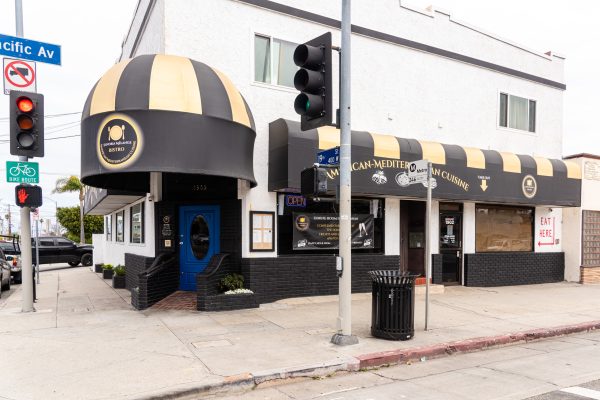
Mike Zislis was fuming when he strode to the podium at the December 15 meeting of the Redondo Beach City Council.
He had just watched a representative from the developers for a pair of North Redondo hotels express their gratitude to the City Council for approving an agreement facilitating the financing and construction of a third hotel.
While that hotelier/city relationship bloomed, he felt his was falling apart. The owner of the 53-room Shade Redondo Beach boutique hotel along the Redondo Waterfront, Zislis had just been served a notice of default from his landlords at the City of Redondo Beach. At issue was a bill for $25,000, owed to the city under the terms of his lease agreement.
“Traditional cities, traditional landlords, traditional human beings would call first,” Zislis said, arriving at the podium with the $25,000 check in hand. “They wouldn’t send a certified letter to the bank without a call first, and put the whole project in jeopardy.”
The notice of default effectively halted the project; Zislis’ accounts were frozen by his creditors, he said, keeping him from paying his contractors.
He further complained that City Attorney Michael Webb’s office had not met with him once in five years of working with the City on the Shade’s construction. “If you need outside counsel to help your internal counsel figure out how to read a contract, I’d pay for that to make sure that I’m not being fined incorrectly, like I feel I am,” he said, believing that he should owe a prorated amount for the days he was late, rather than the full $25,000.
Webb feels that Zislis’s explanation of events is “flat-out false.”
For one, Webb can’t have direct contact with Zislis, he says; he can only make contact with the developer’s legal representatives.
“He knows that,” Webb said. “He’s showed up to City Hall, and [City Manager] Joe Hoefgen was gracious enough to meet him” and explain to Zislis just what, exactly, his obligations are.
Those particular obligations were outlined in the amendments to Zislis’s lease agreement with the city: If the Shade Hotel was not ready by a specific date — Nov. 18, in this case — Zislis owed the city $25,000, due by Dec. 1.
The Shade Redondo project is to be a sister to the massively popular Shade Manhattan Beach, and was called a “signature project” on the Waterfront by former Mayor Mike Gin. In 2013, Redondo’s then-Waterfront Director Pete Carmichael called the project a “significant project catalyst” in the revitalization of the Redondo Waterfront.
“Shade Hotel in a lot of ways is one of the first really significant private investors to come back into the waterfront in a number of years. We’re [seeing], in the last three or four years, the degree to which this has facilitated other private investment [in the area],” Carmichael told the Easy Reader. The original lease agreement was struck in 2008, opening a dam of waterfront reinvestment that’s headlined by CenterCal Properties’ potential Redondo Waterfront redevelopment project.
But Shade Redondo has continually faced stumbling blocks throughout the life of the build, which began in 2013. In August of that year, contractors hit a ninety-old underground seawall, costing the project four months. A later excavation to install plumbing found contaminated groundwater, forcing yet another redesign and delay. Shade also had problems with the site soil and in hitting buried train rails from the city’s port days.
Overall, Zislis says that the project’s budget has ballooned from a projected $14 million to $26 million as a result of its multitude of delays and redesigns. In that time, its opening has been pushed back from Summer 2015 to April 2016.
Throughout that stretch, Redondo amended Zislis’ lease six times, extending construction deadlines, changing the terms of his rent schedule and working out deals to provide additional parking.
“They wouldn’t do this in most cities,” Zislis told the Easy Reader after the fourth extension passed, in late 2013. “It’s just as important for them that I open as it is for me. The city has been 100 percent responsive. It’s incredible, and that’s what it’s going to take to do a project this complicated.”
His feelings, however, soured after the letter of default, which followed failed negotiations to amend the lease further. Those talks fell apart in September. As explained in a letter to Zislis from Hoefgen, the Redondo Council had “no interest in once again amending the lease for [Zislis’] benefit for the seventh time.”
Now, Zislis is reminded of being bullied in school, when a student would needle him in the back with a pencil.
“One day, I just turned around and clocked the kid. I don’t know where it came from, it just happens sometimes,” he said. “The default letter just pushed my button; I’ve never had anything like that without the courtesy of a call.”
Stephen Proud, Redondo’s Waterfront and Economic Development Director, finds the idea of a “courtesy call” impractical.
“We have, many, many leaseholders on the waterfront,” Proud said. “It would be very difficult for us to call each and every one of them if they were late on a rent payment, or in default on a lease.” Plus, if the city didn’t follow proper noticing procedure, he said, it could be subject to legal challenge.
Proud said the notice of default is a “direct result” of the agreement Zislis negotiated. “He knew full well if he didn’t have his hotel opened, he’d be subject to an additional amendment. He signed that and agreed to those terms.”
By the terms of the lease, Zislis is due to start paying $13,833 per month, for 12 months, in unpaid, deferred rent owed to the city, starting in January. That’s in addition to the $17,000 monthly rent he currently pays to the city, according to the lease’s sixth amendment.
In negotiations for the declined seventh amendment, Zislis hoped to have his back rent debt, totaling $166,000, forgiven entirely.
Following a notice that the default was cured with his payment — which Redondo Mayor Steve Aspel personally called to inform Zislis of — the Shade owner has no hard feelings toward Redondo as a whole. He particularly praises the City Council and Planning Department for their assistance in moving the project forward and plans to open the new Shade in April. Still, the lack of a personal reminder from the city regarding his debts has him chafed.
Proud, however, is unaffected. “A letter of default is a reminder notice,” he said. “It’s more official, sure. But not getting a phone call, to me, is much ado about nothing.”









